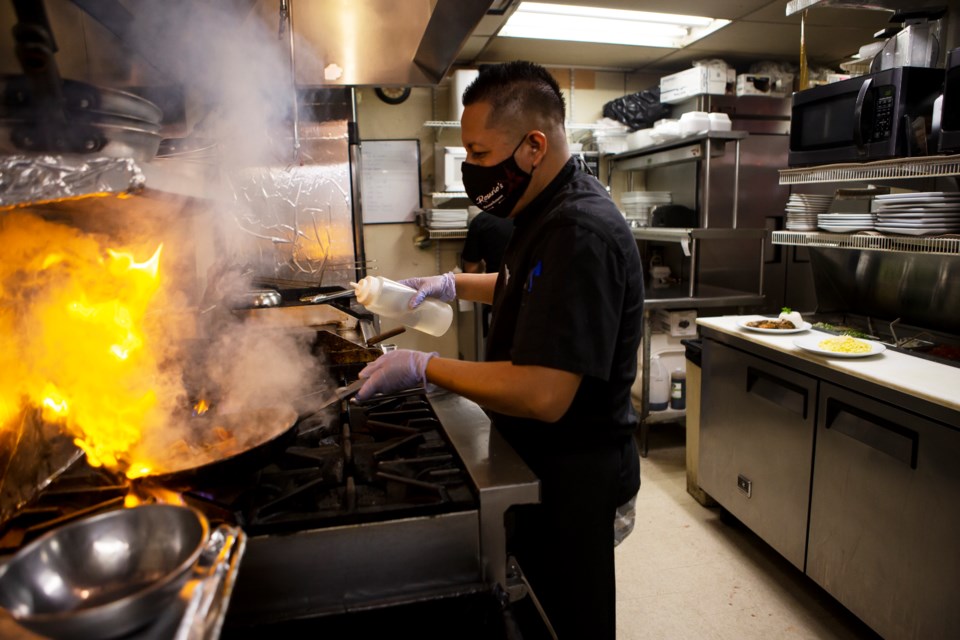When Rosario Cárdenas moved to the U.S. from Peru in 2002, she noticed that there weren’t many Peruvian restaurants around. Taking the recipes she made with her family growing up, Cárdenas opened her own establishment to share the cuisine with Longmont.
The family-owned Rosario's Peruvian Restaurant opened in 2012, originally in Dacono for a year before relocating to Longmont at 625 Ken Pratt Blvd. Cárdenas works with her daughter Estefany Martinez, the restaurant manager, her daughter Diana Cárdenas, and son-in-law Juan Hernandez.
Cárdenas began learning how to cook at age 11, watching her mother making meals for the home. Many of the recipes pull from the home-cooked Peruvian dishes she prepared with her mother. Others, like the “Rosario’s sauce” — a huacatay or Peruvian black mint sauce — are Cárdenas’ original creations. She didn’t always think that owning her own restaurant was possible and worked as a kindergarten teacher in Peru, though she loved making food for family and friends.
“She's always enjoyed that feeling of watching people eat her food and enjoy it,” Martinez said, translating for Cárdenas from Spanish. “It was super gratifying for her.”
Martinez, now 23-years-old, started helping with the restaurant when she was young and has learned how to cook Peruvian dishes from her mom, as Cárdenas had from her own.
When Cárdenas moved to Colorado, she began making food for Peruvian events and festivals including celebrations for Peru Independence Day on July 28. She kept receiving requests to open up a restaurant.
Though Rosario's Peruvian Restaurant opened in Dacono for a year, Cárdenas relocated to Longmont because the family was moving and there’s a Peruvian community in town, Martinez said.
“Finally after lots of hard work and savings I was able to open up my own restaurant here in Longmont,” Cárdenas said in a written response. “At first we had very few clients who were willing to try out Peruvian food for the first time, but once they did they enjoyed it so much that they would tell friends and family and slowly, through word of mouth, we started to become more known.”
At first, the restaurant served some American dishes to be more marketable, Cárdenas wrote. But she realized that Peruvian cuisine was loved by customers of different backgrounds. Rosario's Peruvian Restaurant also attracts customers from different parts of Latin America, Martinez said.
The best part of owning a restaurant for Cárdenas is sharing authentic Peruvian dishes that remind her Peruvian customers of home or introduce people from different cultures to the cuisine.
“Many people come to try Peruvian food just for fun, some to prepare for a future trip to Peru and some because they miss the food their families would prepare for them back home,” Cárdenas wrote. “Hearing people say that my food reminds them of the food their grandparents would make or that the food has made them want to travel to Peru has to be my favorite part of my job.”
One of the ways the restaurant enhances the culinary experience is through its “Peruvian Tours” dishes. The Tours come in 11 varieties and contain three popular items from the menu. Martinez said she often suggests to customers to order more than one Tour combination so they can sample several dishes.
“It's called the tour because it's like you're traveling around Peru trying different things,” Martinez said. “They're just a great way for people to kind of dive in and try a couple different things without over ordering.”
Martinez said her favorite Tour is #1 combo with Papa rellena, a stuffed potato dish, ceviche and Chicken arroz Chaufa — a stir-fried rice.
The restaurant staff have also embraced Peruvian food. Martinez said the majority of the staff aren’t Peruvian but have taken the time to learn the cuisine.
“They've learned to appreciate and love Peruvian food the way that we do,” she said.
Since opening Rosario's Peruvian Restaurant, Cárdenas, has noticed more interest in Peruvian food and easier access to ingredients for traditional Peruvian cuisine. Cárdenas said when she was first starting out, she had a small budget, making it challenging to open a restaurant that doesn’t take shortcuts when it comes to sourcing authentic Peruvian ingredients. Ingredients such as purple corn for the restaurant’s traditional Chicha Morada drink, or the rocoto pepper that for some of the sauces used to be more challenging to find, she said.
Cárdenas recalls working more than 12 hours a day, six days of the week for a long period while growing the business. She never expected the restaurant to be so popular that Rosario’s Peruvian Restaurant consistently has lengthy wait times on the weekends and high ratings on review sites like Google reviews and Yelp.
“From all of this I learned that nothing is impossible if you set your mind to it and that no matter how hard things get, nothing is going to stop me from achieving my dream,” Cárdenas wrote.
Rosario’s Peruvian Restaurant is outgrowing its 15-table restaurant. Cárdenas hopes to expand to a larger location or add franchise restaurants to meet the demand for authentic Peruvian food.



